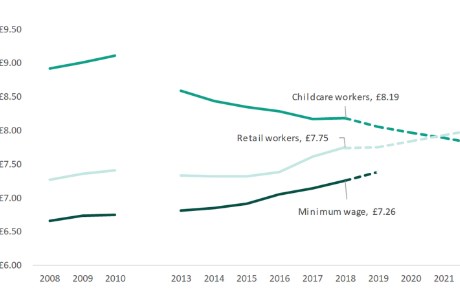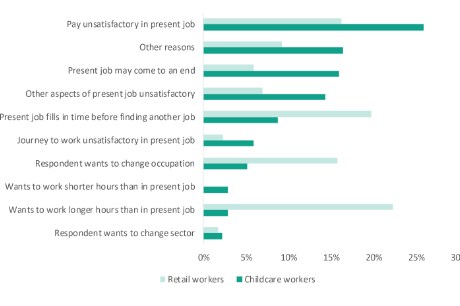Low wages driving childcare workers into retail jobs
Thursday, April 25, 2019
Childcare wages are falling, while those in retail are rising, according to research highlighting the risk of a growing exodus from the early years workforce.

Amid rising concern that childcare workers are increasingly likely to switch to careers in retail, the Education Policy Institute (EPI) has carried out research comparing pay, working conditions, demographics and qualifications of the early years workforce and retail workers in England.
Childcare worker pay is undergoing a sharp real terms decline and based on current trends could be overtaken by retail wages by 2021, according to the findings.
Falling real wages could worsen the current retention and recruitment outlook for the sector, with low pay one of the main drivers for childcare workers leaving the sector, the EPI says.
The early years workforce has faced issues around recruitment and retention for several years, and there is growing evidence that nursery staff are opting to leave the sector to work in retail for better pay and conditions.
With childcare workers unlikely to face any qualification barriers in starting a retail career, the EPI says that combined with the increasing likelihood of higher pay in retail, this is likely to lead to more childcare workers moving into retail jobs.
The research draws on analysis from the Labour Force Survey, which collects detailed information on the UK labour market from 100,000 individuals on a quarterly basis.
Key findings:
- Since 2013 childcare real wages have fallen from £8.59 to £8.19 per hour, while retail wages have risen in real terms from £7.34 to £7.75.
- The average Level 2 qualified childcare worker already earns £0.22 an hour less than a retail worker with a Level 2 qualification.
- 1 in 4 former childcare workers cited ‘unsatisfactory pay’ as the main reason for leaving the sector compared to 1 in 6 retail workers
Real wages, 2008-2010, (including managers), 2013-18 (excluding managers) and 2019-22 (real wages forecast)

Source: The early years workforce - A comparison with retail workers, EPI
With competing sectors offering similar pay, and lower entry requirements, the number of workers in the childcare sector may continue to fall, as the number of leavers exceeds the number of joiners.
The EPI warns that if the retention and recruitment outlook for the childcare sector becomes less favourable, this will have serious implications for access to and quality of childcare, optimum staff to child ratios may not be met, and providers could restrict the number of childcare places available to parents.
Continuing falling real wages also are likely to result in fewer workers with higher qualifications in the sector.
The EPI points out that the proportion of well-qualified staff workers with Early Years Educator status (Level 3) has already been erratic in recent years, standing at 65.9 percent in 2013, 73 per cent in 2016, and 68.3 per cent in 2018.
Main reason for looking for another job, 2018

Source: The early years workforce - A comparison with retail workers, EPI
Commenting on the new research, Avinash Akhal, report author and researcher at the Education Policy Institute (EPI), said, ‘This analysis shows that with declining real wages there is a real risk that childcare workers will shift into retail jobs – which in some cases already offer higher pay while requiring lower qualifications.
‘These trends ought to alarm policy-makers. With high quality childcare playing a vital role in the early years of a child’s life, it is critical that there is a good supply of well-qualified workers. Failure to resolve recruitment problems could impact the provision of childcare and early years education, heightening the chance of development gaps between disadvantaged pupils and their peers widening.’
Stella Ziolkowski, director of quality and training at the National Day Nurseries Association (NDNA), said the research was further evidence of a workforce crisis in early years.
‘We have many settings telling us of difficulties they face recruiting skilled staff and retaining the staff they already have.
‘This research clearly demonstrates an inability for employers to increase salaries. Childcare providers want to pay staff well and reward their skills and experience but as these figures show, they are less and less able to compete in the labour market. In some instances this is causing business failure and nursery closures. We know from our research that qualified early years practitioners are moving out of working in childcare to occupations such as retail for long term prospects in terms of pay.
'These findings represent a real failure of the Government’s workforce strategy. The strategy is not supporting continuity of care for children, or fostering a high quality, happy and engaged workforce which is needed to achieve the best outcomes for children.’
Deborah Lawson, general secretary of Voice, the union for education professionals, said, ‘These pay levels are not commensurate with the skills and education required for early years professionals, especially for those at graduate level.
‘I’ve been saying for years that many skilled early years professionals could earn more stacking supermarket shelves, but stay in the profession because it is their vocation.
‘However, the early years sector has relied on the goodwill of its staff for too long. Is it any wonder that – as the report highlights – there is a recruitment and retention crisis?
‘Voice is calling for appropriate investment and a coherent national pay and career structure to reward the professionals who work in childcare, and to raise the status of the sector and profession.’




